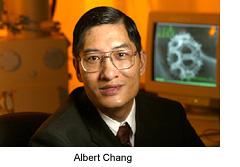
Albert Chang: The beauty of quantum dots
By Monte Basgall
DURHAM, NC -- Physicist Albert Chang left Purdue University for Duke as a professor of physics to continue his groundbreaking work in the "quantum" world -- where measurements are made at a scale of a thousandth the diameter of a human hair.
In that strange realm of the supertiny, not even matter behaves as it does in the human-sized world. For example, it can have the split-personality properties of both a wave and a particle. And, quantum-scale matter absorbs or emits energy in steps, like the shifting gears of a car, rather than a smooth transition.
Physicists like Chang are learning to exploit these qualities in infinitesimal clumps of atoms called quantum dots, that scientists believe could be used as the basis for infinitesimal electronic components that would shrink computers even further and make them far more powerful.
To make a quantum dot, Chang's group works with single crystals, using beams of molecules to add materials and defining nanopatterns with beams of electrons.
One ultimate application is a "quantum computer" that calculates by using a property of electrons known as "spin." His group has made a start by "getting two quantum dots talking to each other as well, if not better, than any other group in the world," he said.
A Detroit native and son of a theoretical physicist, Chang "always knew I wanted to become a physicist since I was 6 years old," he said. As a result, he went on to receive a bachelors degree in physics at MIT before going to Princeton for graduate school.
After obtaining his Ph.D. from Princeton, he became a postdoctoral fellow in the laboratory of Princeton professor Daniel Tsui and also worked closely with another professor, Horst Stormer. Both Tsui and Stormer later shared the Nobel Prize for work on a low temperature phenomenon called the fractional quantum Hall effect.
It was as a Princeton postdoc that Chang's path began steering toward the very small as he worked on the patterning of semiconductor crystals. He continued on that road during his next 12 years at Bell Labs.
At Bell Labs he also began working with Harold Baranger, the current Department of Physics chairman at Duke. "His interests on the theory side closely matched my interests on the experimental side," Chang said.
Both men also left the celebrated New Jersey lab at about the same time, Baranger for Duke and Chang for Purdue. "There are very few scientists who stay at Bell Labs throughout their entire careers," Chang said. He acknowledged that "profound" reorganization changes at the lab also influenced his decision.
The chance to again directly collaborate with Baranger, whom he called "a world expert in the field of quantum dots," as well as with Duke theoretical physicist Konstantin Matveev, then helped Chang decide to leave Purdue.
"It seemed to me like a golden opportunity to form a very synergistic effort," he said. "Another reason was, in talking to the administration here, I was truly impressed by what I saw as commitment and in-depth planning for the development of target areas, of which nanoscience is one."
Chang now looks forward to interacting with the growing numbers of other Duke researchers in chemistry, physics and engineering who work in the nano world. He also looks forward to teaching and interacting with students, from the undergraduate level on up.
"As faculty members, we rely on good students and postdocs to carry out a lot of our work," he said. "The way I always run my classes is that I start off telling the students that I welcome questions. My philosophy of teaching is to be very challenging and thought provoking."
Married with two young children, Chang "started my family life late," he acknowledged. While he no longer finds the time to play softball and other sports, he still enjoys playing classical music on the piano.
"One aspect of this is that music has some mathematical structure that lends itself very naturally to those who are logical," he said. "For me, the other aspect is more emotional. It seems to be able to complement the hard science I do on a daily level."





